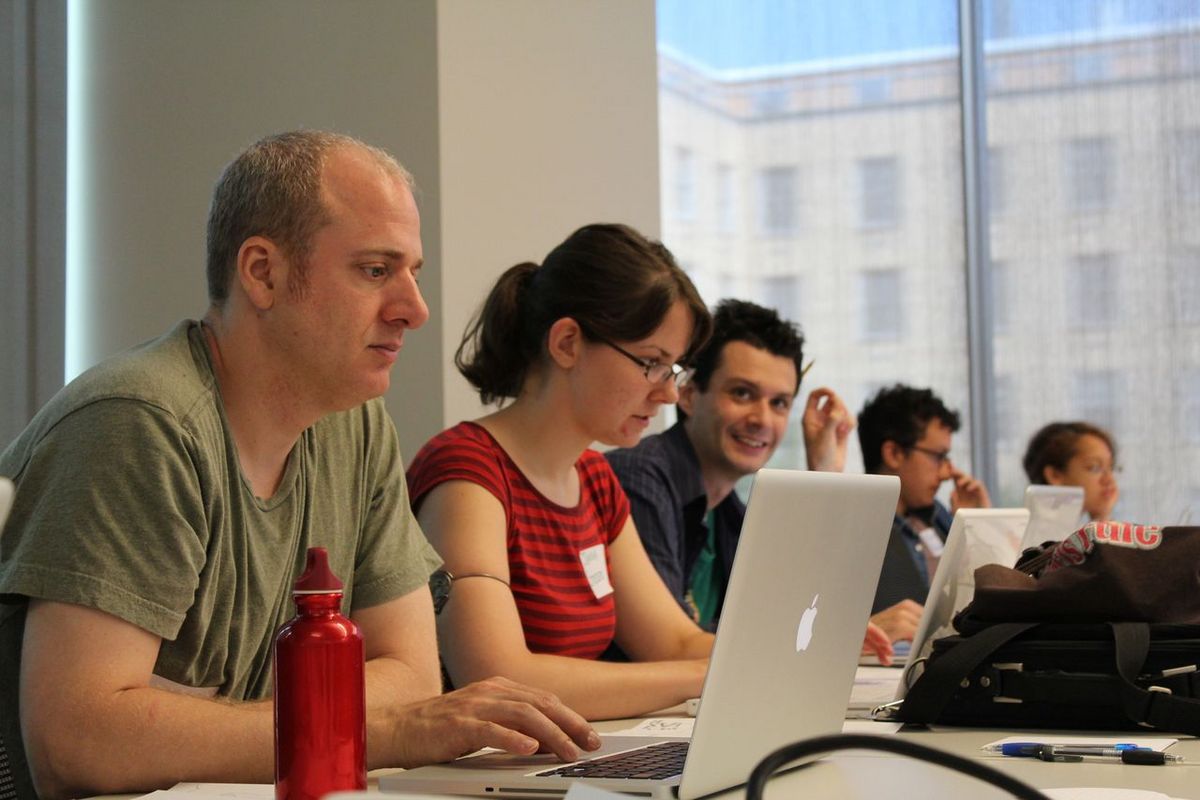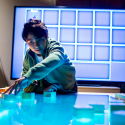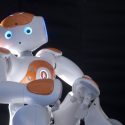Hackathon links humanities and sciences

The Humanities Hackathon summer short course asks participants to look, listen, read and play — digging into data sets from music, texts, images and video games that can be explored with computational techniques.
Photo: Marianne English
Jillian Sayre contends that Herman Melville’s whaling ship Pequod and its encounters with other boats at sea may have toted meaning beyond the characters onboard.
An associate lecturer of English at UW–Madison, Sayre is using computing in innovative ways to glean new insight from the literary classic “Moby Dick,” examining whether networks of the book’s nautical vessels and the complex worlds they represent can help us better understand the text’s preoccupation with communication and connectivity.
But she’s not alone. Sayre represents a growing number of researchers on campus introducing computational approaches to their work. Unlike other universities with formal departments, certificate programs or endowments for digital humanities scholarship, UW–Madison has the grassroots Humanities Hackathon, an ongoing transdisciplinary collaboration between the Wisconsin Institute for Discovery (WID) and the Center for the Humanities.
More than 70 undergraduate and graduate students, faculty members, and staff from both the humanities and the sciences gather outside the classroom throughout the year at monthly “hacks” to uncover unexpected connections and intriguing patterns in music, visual art, literature and historical works (think studying Shakespeare quantitatively, not just qualitatively).
Campus computing resources have traditionally targeted scholars in the hard sciences, but there is increased interest in digital humanities scholarship.
This week, the partnership’s second annual Hackathon summer short course asks participants to look, listen, read and play — digging into data sets from music, texts, images and video games that can be explored with computational techniques. The group will also examine each other’s data sets for a collective learning experience.
But this community, focused on new fields and methods, has influenced more than just humanities circles over the past year.
Lauren Michael, a research computing facilitator at WID who led a Hackathon session in the spring, says campus computing resources have traditionally targeted scholars in the hard sciences, but because of the increased interest in digital humanities scholarship, she and her colleagues have had to rethink the range of services offered to campus.
“What I’m finding is that computing has been a big part of research for the sciences for quite a while, so those researchers tend to be more familiar with the challenges of using it,” Michael says. “Each party needs to meet the other halfway to understand each other, but that distance is short in the sciences. With the humanities, both parties have to travel much farther, and we’re working on ways to narrow that gap.”
Michael sees the humanities becoming a larger focus area for the newly launched Advanced Computing Infrastructure (ACI) that offers computing resources and expertise to help researchers in any field on campus realize the full potential of their projects.
There’s also a level of excitement in developing these new approaches, she says. Take text analysis, for example.
“In the past, you had to look at trends by word in each work, but there are newer, more advanced programs that can draw context, theme and meaning from text rather than just counting words,” Michael says. “It’s kind of like a reliable meta-analysis performed by computing, where people are drawing new comparisons and conclusions that were impossible before.”
“Each party needs to meet the other halfway to understand each other, but that distance is short in the sciences. With the humanities, both parties have to travel much farther.”
Lauren Michael
Mark Vareschi, an assistant professor of English, attended the first short course in summer 2012 and has returned for the 2013 event. Since last year, he’s made steps toward integrating computational techniques into his analysis of 18th century British playbills. Setting the parameters of what data points to collect remains a challenge that requires extensive background, but he’s drawn to the possibility of using computing to automate some of the process, saving him time and energy to put toward other aspects of the project.
“The Hackathon has changed how I do work and think about scholarly workflow,” he says. “It’s a meeting place that doesn’t normally exist, where I’ve really felt inspired to collaborate and ask questions of collaborators that I may not have asked before.”
Other Hackathoners have brought techniques back to projects in philosophy, musicology and even machine learning.
Sayre, who introduced a “Moby Dick” network challenge to her students last spring, says the process of meeting experts in other fields can be just as rewarding as building answers to her research questions.
“The coolest thing I witnessed at the monthly hacks was seeing more and more programmers attending,” she says. “They’re interested in some of the same questions I’m asking, and it’s not just a one-way street.”
—Marianne English



